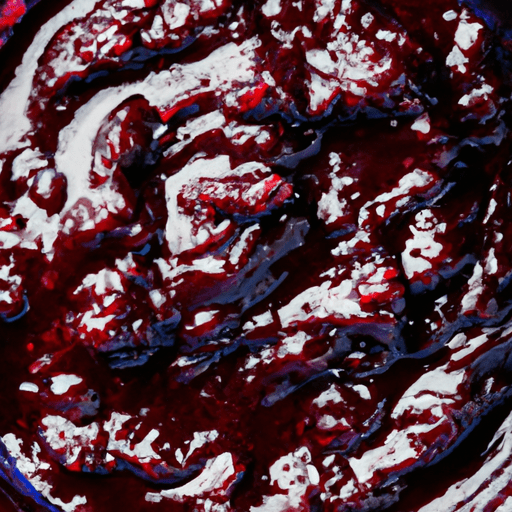Exploring the Delight of Sugar-Free Blueberry Jam
Few things can rival the delightful taste and vibrant color of blueberry jam. It’s a classic spread that never fails to bring a burst of sweetness to your morning toast or afternoon scone. But what if you’re watching your sugar intake? Can you still indulge in the sweet delight of blueberry jam without compromising your health goals? Absolutely! Enter sugar-free blueberry jam—a delicious, guilt-free alternative that will satisfy your cravings while keeping your blood sugar in check.
The Taste of Sugar-Free Blueberry Jam
Sugar-free blueberry jam offers a unique flavor profile that is slightly tart, tangy, and bursting with the natural sweetness of blueberries. The absence of added sugar allows the true essence of the fruit to shine through, providing a more intense and authentic blueberry experience. Despite the reduced sweetness, this jam retains all the lusciousness and mouth-watering qualities that make regular blueberry jam such a beloved staple.
Common Uses in Cooking
Sugar-free blueberry jam is an incredibly versatile ingredient that can be used in a variety of dishes and recipes. Here are a few popular ideas to get your culinary creativity flowing:
1. Spread it on Toast
The classic use of blueberry jam remains a timeless option. Slather it generously on freshly toasted bread for a quick and satisfying breakfast or snack.
2. Add it to Yogurt
Kick your morning yogurt up a notch by spooning in some sugar-free blueberry jam. It adds a vibrant burst of flavor and a sweet touch to your favorite yogurt bowl.
3. Create a Sweet Glaze
Use sugar-free blueberry jam as a glaze for roasted meats or poultry. The natural sweetness pairs wonderfully with savory flavors, creating a balanced and tantalizing dish.
4. Mix it into Desserts
Get creative in the kitchen by incorporating sugar-free blueberry jam into your favorite dessert recipes. Whether it’s a cheesecake, muffins, or thumbprint cookies, the jam will lend a beautiful burst of flavor to your sweet treats.
Nutritional Value
Sugar-free blueberry jam not only satisfies your taste buds but also offers a range of nutritional benefits. Here’s a glimpse into what this delicious spread brings to the table:
Low in Calories: By avoiding added sugars, sugar-free blueberry jam is significantly lower in calories compared to regular jam, making it a great option for those aiming to manage their calorie intake.
Excellent Source of Antioxidants: Blueberries are packed with antioxidants, which help protect your cells from free radicals and may offer several health benefits, including improved heart health and cognition.
Rich in Vitamins and Minerals: Blueberries are a good source of Vitamin C, Vitamin K, and manganese. These vitamins and minerals promote overall health and contribute to a strong immune system.
Fiber Content: Blueberries are also naturally high in fiber, which aids in digestion, promotes feelings of fullness, and is beneficial for maintaining a healthy weight.
A Brief History and Fun Facts
Blueberries have a rich history in North America, with Native Americans using them extensively for centuries. Early settlers of the continent also recognized the value of these small, flavorful berries. Today, blueberries are enjoyed worldwide and have become an iconic fruit in American cuisine.
The United States is the largest producer of blueberries globally, accounting for approximately 90% of the world’s production.
Blueberries are often referred to as a “superfood” due to their high nutritional content and numerous health benefits.
Blueberry consumption has been associated with improved brain function, memory, and eye health, thanks to their antioxidant properties.
Sugar-free blueberry jam is an excellent option for individuals with diabetes or those following a low-sugar or keto diet.
There you have it—a deep dive into the world of sugar-free blueberry jam. Now you can enjoy the irresistible flavors of blueberries while keeping your sugar intake in check. So go ahead and indulge in this delicious and healthier alternative, knowing that you’re making a mindful choice without sacrificing taste or enjoyment.
Sugar-Free Blueberry Jam
Origin: Blueberries are native to North America and have been enjoyed for centuries by Indigenous peoples. The cultivation of blueberries began in the early 20th century, and today they are widely grown in various regions across the world, including the United States, Canada, Europe, and Australia.
Common Uses: Sugar-free blueberry jam is a popular alternative to traditional blueberry jam for those seeking to reduce their sugar intake. It can be used in a variety of ways, such as spreading on toast or biscuits, filling pastries, or adding a flavorful twist to yogurt or oatmeal.
Nutritional Benefits: Blueberries are known for their high antioxidant content, which may help protect against oxidative stress and inflammation in the body. They are also a good source of dietary fiber, which can aid in digestion and promote a feeling of fullness. Sugar-free blueberry jam typically contains fewer calories and carbohydrates compared to regular jam, making it a suitable option for individuals following a low-sugar or low-carb diet.
Unique Properties/ Historical Significance: Blueberries have a unique flavor profile that combines sweetness and acidity, which contributes to their popularity in jams and preserves. Sugar-free blueberry jam is made without the addition of refined sugar, and instead, natural sweeteners like stevia or erythritol are often used as alternatives. This allows individuals with dietary restrictions or those who choose to limit their sugar consumption to enjoy the taste of blueberry jam with reduced sugar content.
It’s worth noting that the cultural significance of blueberries varies across different indigenous communities in North America. Native American tribes have long valued blueberries for their culinary and medicinal uses. Additionally, wild blueberries have been an important resource for many communities, providing sustenance and nutrition throughout history.




Use the share button below if you liked it.
It makes me smile, when I see it.